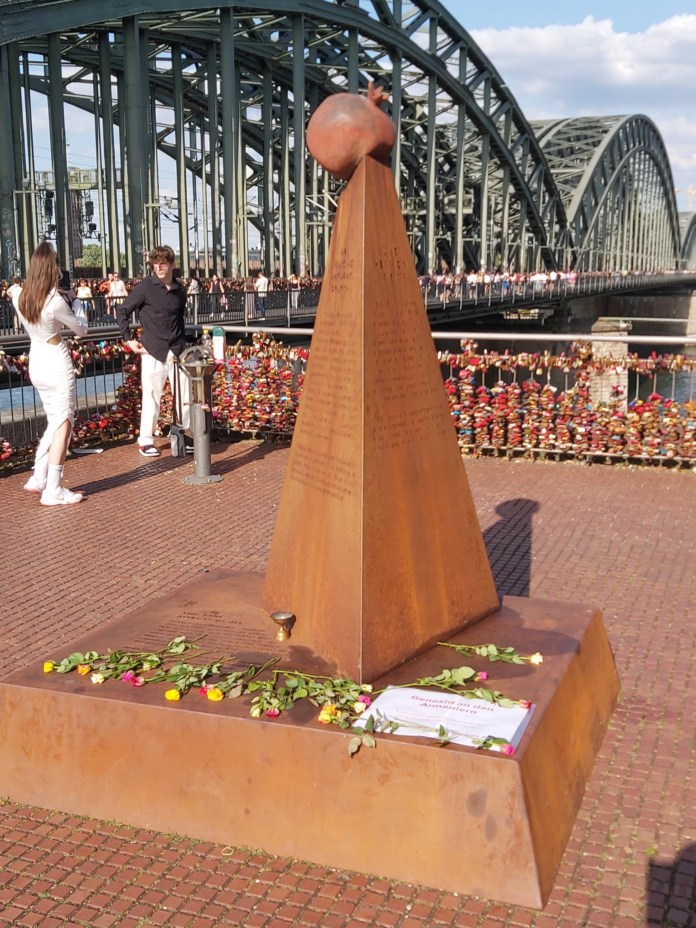
The Cologne Genocide Monument
Armenian Genocide Monument: Remembrance or Denial?
by Muriel Mirak-Weissbach
the Armenian Mirror Spectator
COLOGNE, Germany, DECEMBER 14, 2023 — “This pain affects all of us.” So reads the text borne by a monument in the German city of Cologne along the Rhine River. It refers to the genocide perpetrated by the Young Turk regime during World War I against the Armenian population. But the words take on further meaning in light of the fact that, after a long political battle for and against the monument, a decision has been made to remove it.
As reported in the local Kolner Stadt-Anzeiger newspaper on November 29, the monument currently located on the Hohenzollern Bridge should disappear by the end of this year. After its removal, a new monument will be erected by the city, “commemorating the victims of repression, racism, violence, and human rights violations.” According to reports, the new monument that the City Council is discussing would take two years to come into being. A “dialogue process” is scheduled to begin sometime “by the end of this year,” at the same time the existing memorial will be taken away. The projected cost of the initial phase of the project, to be handled by an agency, is $120,000. Fifteen artists are to present their designs in a competition. Once the best design has been selected, work on the monument should begin, at an estimated cost of $350,000. All told, that should add up to a hefty half million dollars, according to reports carried by the same newspaper.
Denial Is the Issue
The memorial has a brief, but checkered history. “Remember Genocide” is the name of the civil society group behind the monument. Designed to honor the victims of the 1915 genocide against the Armenians, the 1-1/2-meter-high stele was placed in a prominent city location on the commemoration day April 24, under a special permission granted by the city. That permit was, however, limited to a month, a restriction that the initiators challenged, and it went to the administrative court. In the end, the court accepted the city’s plan to remove it, but then Lord Mayor Henriette Reker intervened in defense of the commemoration. “I can understand very well that there is such a great desire for a visible monument,” she was quoted as saying in June. Referencing the Armenian genocide recognition resolution passed by the Bundestag (Parliament) in 2016, she said Germany’s historical responsibility to remember is “beyond question,” and added that Cologne is home to the largest Armenian diaspora community in the country. Reker therefore announced she was issuing directives to undertake necessary procedures “to make a monument possible in Cologne.” To this end she proposed a “dialogue process.”
The real issue is genocide recognition or denial. Ilias Uyar, a leading figure in the “Remember Genocide” group, had made the point when the proposal for a new structure had first been aired. Taking the monument away would be adding “grist to the mill of the genocide deniers,” he put it succinctly. And he demanded that the proposed dialogue process place genocide at the center of debate about a monument.
In autumn, the two sides faced off. For the centenary of the founding of the Turkish Republic on October 29, a coalition of Turkish organizations scheduled a demonstration against the monument. The same day, the Turkish-German Cultural Forum (KulturForum Turkei-Deutschland), which was also celebrating its 30th anniversary, held an event with prominent guests, Federal Agriculture Minister Cem Ozdemir, journalist Can Dundar, activist Gunter Wallraff, author Asli Erdogan and many others. The large gathering convened in the afternoon at the genocide memorial. Ozdemir and State Legislator Berivan Aymaz, also of the Green Party, were laying flowers at the memorial, they said, “to safeguard memory of the victims of the genocide and to protect the memorial from genocide deniers.” As part of that protective action, they had brought charges against the Turkish agitators, accusing them of incitement.
Confronting them at the memorial site were members of the Turkish nationalist group, “Turk-initiative,” who had arrived on the scene at noon, to register their protest and denial. This coalition comprises several local Turkish organizations, including the Ditib Mosque Union, and right-wing extremist outfits like the Grey Wolves. The same group announced that it would hold a historical conference this year in Cologne, according to press reports, on “the suffering, migrations, and massacres that occurred before the First World War and during the collapse of the Ottoman Empire in a vast geographical area, to deal with the subject comprehensively and fairly, and to include all points of view.” In reporting these words, the Kolner Stadt-Anzeiger pointed out that there was no mention of genocide in the program, and added, “Recently representatives of the initiative, whose speaker in charge of inter-religious dialogue is a Ditib official, had a meeting in the Turkish consulate — the representative of the Turkish state.”